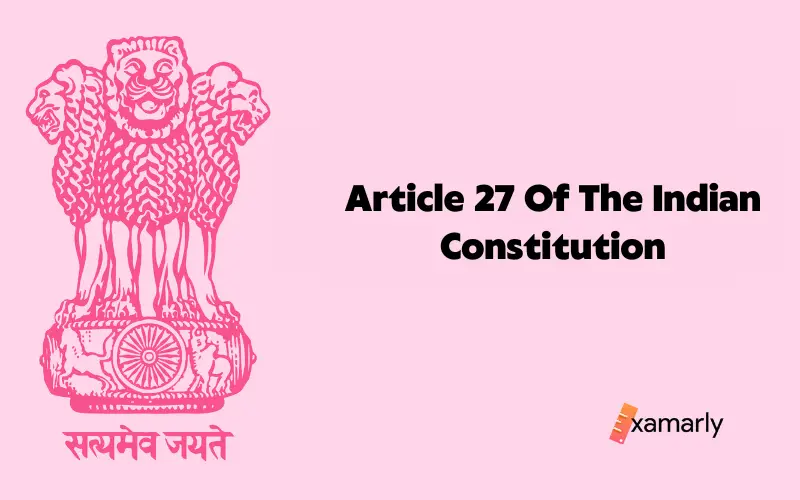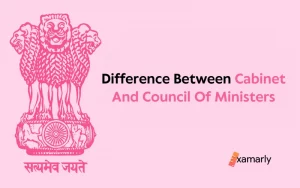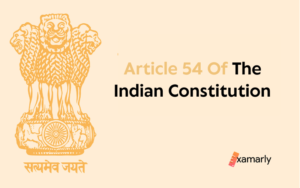The fundamental rights guaranteed by the Constitution are held in Part III of the Indian Constitution.
Article 27 is one such constitutional provision that falls under the category of ‘Freedom of Religion’ and is a fundamental right. It provides the citizens of the nation the privilege of not being compelled to pay taxes by the State for religious purposes.
This is because it would promote a certain religion or religious denomination. It can be said that Article 27 protects the validity of Article 25 which deals with the ‘freedom of conscience’.
Let us dig deeper into Article 27 of the Indian Constitution.
- Article 27: Freedom As To Payment Of Taxes For Promotion Of Any Particular Religion
- Analysis Of Article 27
- What Are The Constituents Of Article 27?
- Debates Held Around Article 27
- Religious Freedom With Reference To Article 27 Of The Indian Constitution
- Violation Of Article 27 Of The Indian Constitution
- Landmark Cases Related To Article 27
- The Commissioner, Hindu Religious Endowments, Madras V. Sri Lakshmindra Thirta Swamiar Of Sri Shirur Mutt (1954)
- Mahant Sri Jagannath Ramanuj Das V. The State Of Orissa (1954)
- Summing Up
- FAQs
Article 27: Freedom As To Payment Of Taxes For Promotion Of Any Particular Religion
The text of Article 27 as mentioned in the Constitution of India states the following:
“27. Freedom as to payment of taxes for promotion of any particular religion. No person shall be compelled to pay any taxes, the proceeds of which are specifically appropriated in payment of expenses for the promotion or maintenance of any particular religion or religious denomination.”
Analysis Of Article 27
- Article 27 of the Indian Constitution provides that an individual cannot be forced to pay taxes under a specific condition. The condition is that the earnings are used to cover the costs associated with promoting or maintaining a specific religion or religious sect.
- In general, paying taxes is a taxpayer’s duty. It is also a responsibility. An exemption is put in place if tax money is used to support, promote, or preserve a particular religion or religious denomination. The special provision of Article 27 offers a tax exemption for religious activity which highlights the secular nature of the State.
- For instance, consider a State imposes a tax to promote the Hindu faith. In such a case, it would be perfectly legal for someone to refuse to pay a tax.
- An alternative interpretation of Article 27 can be made. The state shall refrain from using taxpayers’ money for religious intent. It could either be for the maintenance or promotion of any one religion. This article forbids the State from promoting one religion over another. It should not show bias towards any religion. This indicates that taxes may be applied for the advancement of all religions. Also, all religions must be supported in an equal manner.
- This is to ensure that a fee can be used to regulate the secular management of religious institutions. Its purpose is not to support or uphold a particular faith. As a result, pilgrims may be charged in order to receive special services. They may also be charged for security precautions. Likewise, religious endowments may be charged a fee. This can be done if such endowments cover the required expense.
You Might Also Like – Article 39 Of The Indian Constitution
What Are The Constituents Of Article 27?
Article 27 of the Indian Constitution is constituted of four elements, namely- person, tax, promotion, and continuance of a particular religion or religious denomination. The definition of ‘person’, the meaning of ‘tax’, and the difference between ‘tax’ and ‘fee’ have been discussed below.
Definition Of ‘Person’
- The legal understanding of the term ‘person’ assumes a different meaning than the dictionary meaning. The General Clauses Act, of 1897, issued a taxation statute that holds the definition of ‘person’ as legal jargon.
- Consider a situation where the tax is levied as per the Income Tax Act, of 1961. It would then be essential to refer to the Income Tax Act’s definition of ‘person’. The definition found in the General Clauses Act must be used only on one condition. This may be done if the statute does not explain the term ‘person’.
- The General Clauses Act, for the meaning of the term ‘person’, takes into consideration:
- An individual;
- A company;
- A body of individuals, whether they are incorporated or not; and
- An association, whether they are incorporated or not.
- Under the Income Tax Act, 1961, the following comes under the meaning of the term ‘person’:
- An individual;
- A company;
- A Hindu undivided family;
- A firm;
- An association of persons, whether incorporated or not;
- A body of individuals, whether they are incorporated or not;
- A local authority; and
- An artificial juridical person.
- The Central Goods and Services Act, 2017, includes the following within its ambit of meaning ;
- An individual;
- A Hindu undivided family;
- A company;
- A firm;
- A Limited Liability Partnership;
- An association of persons;
- A body of individuals, incorporated or not, in India or outside India;
- A trust;
- A local authority;
- Central or State Government;
- A society under the Society Registration Act, of 1860;
- An artificial juridical person;
- A cooperative society;
- A body corporate incorporated under the laws of a foreign country;
- Any government company, as defined under the Companies Act, 2013; and
- Any company established under a State Act or Central Act.
Tax
- The dictionary meaning of the term ‘tax’ is slightly different. It explains it as a fee that the government imposes on specific individuals in order to pay for public services.
- The General Clauses Act does not include a definition for the said term. Therefore, one needs to consult the definition provided by the particular statute. This would help in determining its meaning in the given context.
- Let us understand this better with the example of ‘tax’ as per the Income Tax Act. Under the Act, the term means the income tax that must be paid in accordance with the Act’s provisions. Therefore, it is important to refer to the definition given by the Income Tax Act if the aforementioned tax is levied in accordance with that Act.
- The important elements of a tax have been listed according to the case of The Commissioner, Hindu Religious Endowments, Madras v. Sri Lakshmindra Thirtha Swamiar of Sri Shirur Mutt (1954). They are as follows:
- The enforcement of tax must be a common financial burden of taxpayers.
- The tax must be imposed as a measure for adding to the general revenue of the State.
- The collection that is received from the imposition of a tax must contribute to the State in the form of its consolidated funds.
How Is Tax Different From A Fee?
It is crucial that the payment imposed on a person is ‘tax’. It must not be a ‘fee’. Fees imposed by the State are beyond the scope of Article 27 of the Indian Constitution.
| Difference | Tax | Fee |
| Purpose | It is collected either in the interest of the public or as general revenue. | It is charged for providing special service (quid pro quo). |
| Compulsion | Tax is mandatory for everyone. | It is requisite for people providing the service (they might or might not be able to choose whether to use the service). |
| Quantum | The person’s capacity decides the quantum. | Primarily, the quantum has uniformity. |
| Funds | The combined fund of the State receives the collected funds. | The funds are set aside to cover costs associated with the service provided. |
| Reference in a specific list of the Indian Constitution | The Union List and State List refers to tax. | The Concurrent List refers to the fee. |
Debates Held Around Article 27
- Article 27 of the Indian Constitution was discussed and talked through in the Constituent Assembly. Several revisions were suggested by the members of the assembly.
- Mr. Syed Abdur Rouf suggested adding the phrase “wholly or partially.” This addition would violate Article 27. This is because it would render a specific appropriation of taxes, in parts or whole.
- Mr. Naziruddin Ahmad recommended the substitution of ‘the proceeds of which’ with ‘on any income of which’. According to his understanding of the article, it states that taxes derived from the earnings of an undertaking are not to be utilized to support or advance any one religion. The broad understanding considers all types of taxes such as the goods and services tax levied on the price of the goods or services. Mr. Ahmad’s interpretation just considers the income tax.
- Article 27 was supported by Shri Ayyangar as he made a significant claim that no religious denomination should be given an advantage over another under the protection of the Charter of Liberty and religious freedom.
- Similarly, Shri Guptanath Singh incorrectly concluded the provision of the said article. He believed that it exempted religious institutions’ property from taxes.
- Deliberation was done over the proposed changes. Ultimately, the Constituent Assembly denied all these amendments.
Religious Freedom With Reference To Article 27 Of The Indian Constitution
- The right to practice one’s religion or conscience without unjustified limitations is known as religious freedom which is embedded in Article 27 as a fundamental right.
- Article 25 which deals with freedom of conscience implies, in a sense, the freedom from being forced to support a specific religion or religious group. Article 27 complements this understanding of the former article. Atheists’ right to their freedom of conscience is safeguarded. This is because no individual shall be forced to pay taxes that promote any one religion.
- Moreover, Article 27 is not violated by any taxes levied on a religious institution’s secular administration. The case of The Commissioner, Hindu Religious Endowments, Madras v. Sri Lakshmindra Thirtha Swamiar of Sri Shirur Mutt supports this point of view as well.
Violation Of Article 27 Of The Indian Constitution
Article 27 is violated under any of the following conditions:
- There is a tax that has been imposed;
- A compulsion to pay the tax has been put in place;
- Its proceeds would be used to intentionally and explicitly promote or maintain any specific religion or religious denomination; and
- The State has a primary reason to levy the tax. This is with the goal of intentionally and explicitly promoting or maintaining any specific religion or religious denomination.
Landmark Cases Related To Article 27
Let us now take a look at cases that were landmarks involving Article 27 of the Indian Constitution due to the judgment passed by the Supreme Court of India.
The Commissioner, Hindu Religious Endowments, Madras V. Sri Lakshmindra Thirta Swamiar Of Sri Shirur Mutt (1954)
- In this case, the dispute between tax and fee under Section 76 of the Madras Hindu Religious Endowments Act and whether it was a violation of Article 27 of the Indian Constitution was brought to court.
- The Supreme Court held that the contribution collected under Section 76 of the Act is to be counted as tax as it resembles income tax in more than one way.
- The collected funds are not put aside to cover the costs of providing the services by the government. Rather, the purpose is the appropriate management of religious organizations and the endowments associated with those institutions.
- The Supreme Court has ruled that it is unconstitutional to use public funds to support or maintain any certain religion or denomination.
- Keeping in mind the above observations, it was concluded that there was no instance of violation of Article 27 of the Indian Constitution in this case.
Mahant Sri Jagannath Ramanuj Das V. The State Of Orissa (1954)
- This case challenged Section 49 of the Orissa Hindu Religious Endowment Act as a violation of Article 27 of the Indian Constitution and questioned the levying of contributions under the same section as a tax.
- The Supreme Court passed its judgment stating that in no way does Section 49 violate Article 27 as the contributions levied under this section are to be regarded as fees instead of a tax.
- The amount collected would be used for administrative purposes such as the proper and secular administration of the religious institutes. It is not used to spread or maintain the Hindu religion.
Related – Freedom as to payment of taxes for the promotion of any particular religion.
Summing Up
- Article 27 of the Indian Constitution attempts to keep the freedom of religion intact. It prohibits the state from misusing tax laws.
- It is crucial that the freedom of religion applies to financial matters as well as to religious activities as the relationship between finance and religion must be taken into consideration.
- Article 27 also empowers the concept of secularism. The article resonates with the objectives of Indian secularism by promoting secular activity. The collective act of defiance against paying taxes that would support a particular religion can exert political pressure on the State that pursues a religiously prejudiced agenda.
FAQs
Q. What is the significance of Article 27 of the Constitution of India?
Article 27 dismisses the payment of tax for religious purposes. No compulsion can be put on tax payment for the advancement or preservation of a specific religion or religious group.
Q. Which Draft Article was instrumental in forming Article 27 of the Indian Constitution?
Article 27 of the Indian Constitution was finalized from Draft Article 21.
Q. When was Draft Article 21 debated and adopted?
Draft Article 21 was debated and adopted without any changes on December 7, 1948.






